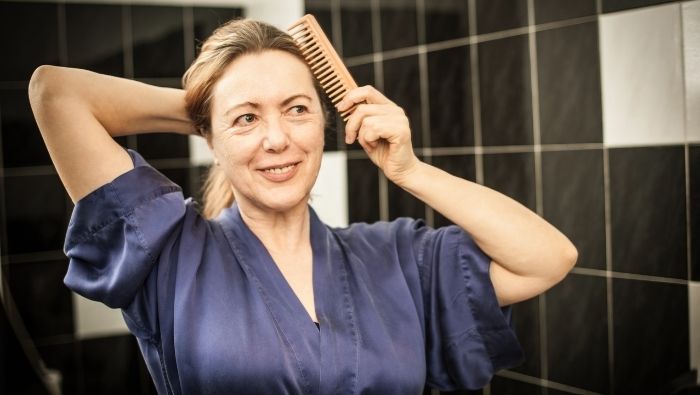Thinning Hair? 4 Ways To Slow Hair Loss
by Amy Osmond Cook, Ph.D.

Thinning hair doesn’t have to mean thinning hope. These affordable methods for slowing hair loss can help you reverse the hair loss curse.
One inevitable fact of life is that thinning hair is a common byproduct of aging. Studies show that up to 50 percent of women over 50 will experience hair loss. Sadly, many of us have a genetic predisposition to hair loss called androgenetic alopecia.
“As we age, overall density changes and individual strands become finer,” dermatologist Doris J. Day explained in an article for Prevention.com.
Before you silently accept your follicle-deprived fate, here are some methods that have been shown to reduce the rate of hair loss.
1. You are what you eat.
Your hair is a direct reflection of your diet, so if you don’t like what’s happening on your head, you should pay attention to what’s going in your mouth. Good nutrition has various benefits for your health, but your hair stands to benefit from a diet loaded with protein, zinc, iron, and vitamin B12.
Since hair is mostly made up of protein, it requires protein to grow. If your diet lacks sufficient protein, you may shed hair strands more quickly.
Take a look at the best foods for healthy hair, according to WebMD.
2. Get a massage.
Many people have found success in performing a daily scalp massage. According to Livestrong.com contributor Shemiah Williams, a three-minute scalp massage not only stimulates the scalp and improves circulation it reduces stress. However, there is no medical evidence fully supporting massaging the scalp as a proven method for preventing hair loss.
3. The heat is on.
Ironically, sometimes, our efforts to improve our hair’s appearance are the very thing contributing to its departure. Heated styling products are one of the biggest culprits to increased hair loss.
According to Everyday Health contributor Kristeen Cherney, Ph.D., “blow-drying too frequently, repeatedly using heated styling tools” can contribute to hair damage and hair loss.
Hot hair appliances cause the most damage to your hair when you use them on wet hair. Some devices get so hot they boil the water in your hair shaft, which leaves your hair brittle.
4. Avoid certain medications.
If you need an added incentive to improve your health to the point of decreasing your medications, hair loss could be a strong motivator. Many prescription medications contribute to increased hair loss in men and women.
“Blood-thinning medications, oral contraceptives, drugs for depression, anti-inflammatories, and beta and calcium channel blockers can all lead to thinning hair or baldness,” wrote Dr. Cherney. The good news is that your doctor may be able to prescribe an alternative medication.
With new products hitting the store shelves on a seemingly weekly basis, it’s essential to research the effectiveness of these methods to determine which ones look promising or should get the brush off.
Reviewed April 2025
Popular Articles
- Comparing Retirement Housing Options
- How We Retired With Almost No Savings
- How Retirees Can Live on a Tight Budget
- 9 Things You Need to Do Before You Retire
- What You Need to Know About Long Term Care Insurance Before You Retire
- You Didn’t Save Enough for Retirement and You’re 55+
- Could Debt Derail Your Retirement? A Checklist
- Your Emergency Fund In Retirement: A Comprehensive Guide
- Managing Your 401k In Your 50s

